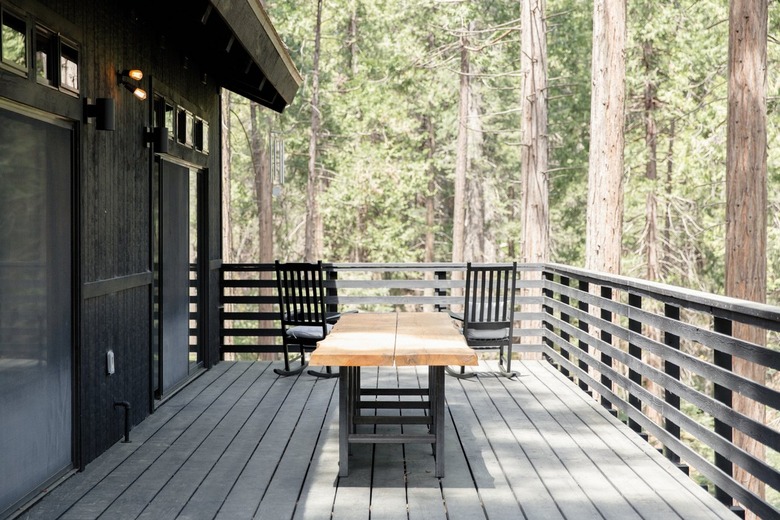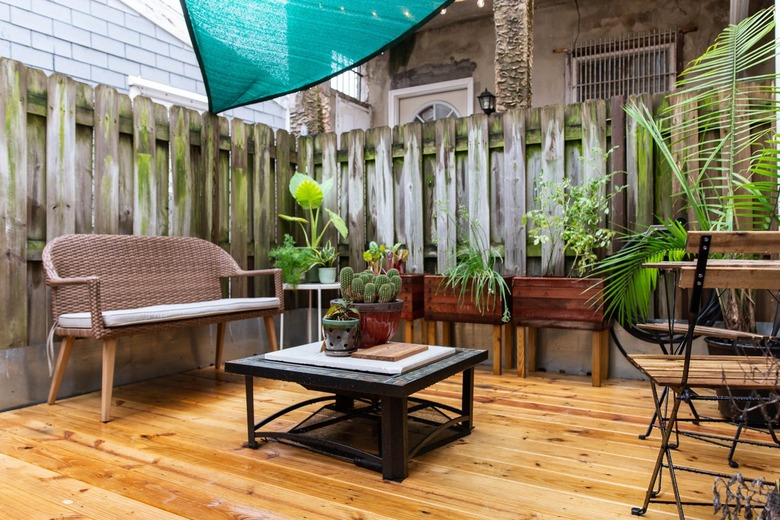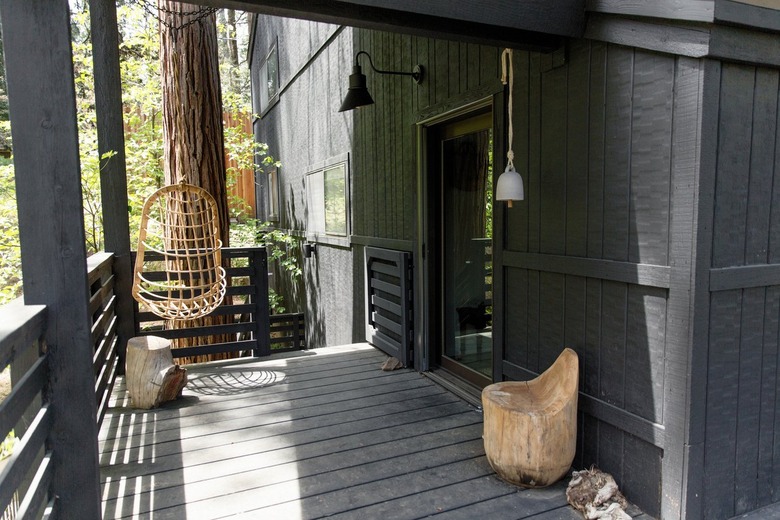What To Know Before You Hire A Deck Builder
A beautifully built deck can set the scene for dining alfresco, entertaining friends on your patio furniture, and simply expanding your living space outdoors. Though they are fairly simple designs, only the very handy among us can DIY a deck project, which means you'll need the services of a deck builder.
The right deck design can not only be functional — it can transform the look of the backyard, acting as the focal point in the landscape and complementing the existing hardscape and plantings. Ready to hire a deck builder to enhance your outdoor living space? Here's everything you need to know.
What a Deck Builder Does
What a Deck Builder Does
Compared with some other construction projects, building a deck can be a relatively simple process. That is not to say that there aren't complicated deck designs that require real expertise to build, but most are straightforward designs that competent craftspeople can handle. Because of that, when you begin searching for a contractor, you will find that many different types of construction companies include deck building as part of their business.
There are those that concentrate solely on decks and other outdoor living spaces, and they usually have "decks" in their name. There are others that do different types of construction, such as interior remodeling, siding, and roofing as well as decks.
Though deck contractors offer different levels of service, here's generally what you can expect they have the capability to do:
- Design the deck. This will include coming to the site, taking measurements, and discussing your plans for the deck. There will usually be some preliminary drawings for you to approve or amend. An experienced designer can solve problems, such as placing a deck in a small space and working around existing landscaping.
- Discuss deck materials. Most decks are constructed at least partially with pressure-treated lumber, but cedar, redwood, and a variety of tropical hardwoods, such as ipe, are also options. There are a number of nonwood decking materials available. Nonwood options are touted as being low-maintenance, and many look like real wood.
- Discuss extras. Today's decks can include built-in seating, built-in planters, lighting, shade structures, outdoor kitchens, and more.
- Obtain building permits. The deck builder should be aware of local building codes. They will also schedule inspections by the local building department during construction.
- Order deck materials. There may be lead time when ordering anything but pressure-treated lumber. A good deck builder will be aware of how long it takes to obtain the necessary materials.
- Build the deck. Construction includes any extras, such as built-ins, lighting, and the like.
- Finish the deck. Wood decks must be stained or otherwise finished to protect the wood from the weather.
- Maintain the deck. Few deck builders do this, but even the most low-maintenance deck requires periodic cleaning, and wood decks need fresh coats of protective finish.
Doing Your Homework
Doing Your Homework
Before you hire your deck builders, you should at least have a sketch in your mind of what you want your deck to look like (or at least what types of materials you'd like to use). There are many different decking materials as well as custom deck options when it comes to adding railings, stairs, built-ins, and other extras.
In recent decades, a number of alternatives to wood have hit the market, although wood is still the dominant material (and any deck builder is able to construct a deck using it). The alternatives are nonwood products that are designed to improve on the performance of wood. They are marketed as durable and easy to maintain, but they are not entirely maintenance-free. The most popular deck materials include:
- Pressure-treated wood. This is the most frequently used product and also the least expensive. Treating the wood, usually pine, with preservatives protects it against insects and rot.
- Cedar. This species has a rich color and is naturally resistant to insects and decay.
- Redwood. This species has the same characteristics as cedar. Redwood may be hard to find in some areas.
- Tropical hardwoods. This is very dense wood that is naturally resistant to decay. In addition to ipe, other species include garapa, cumaru, tiger wood, and others.
- Composite decking. This is processed from wood dust and plastics (many recognize the brand Trex most often). Some versions are capped with plastic. The material is available in a variety of colors and designs.
- PVC decking. The look and characteristics are similar to composites, but it is very lightweight when compared with other materials.
- Aluminum decking. It may seem odd, but aluminum is used as a decking material. The finish lasts for years, it's insect-proof, it's lightweight but strong, and it's recyclable. Although it may seem counterintuitive, aluminum decking stays cool to the touch in sunlight because it dissipates heat rapidly.
One thing to remember when selecting decking products is that decking refers to the top surface of the deck — the part on which you walk. The substructure, which includes the posts, beams, and joists, is usually constructed of pressure-treated lumber no matter what composes the decking. Nonwood alternatives are not strong enough for the substructure components, and even cedar and redwood decking is usually supported by pressure-treated lumber.
Deck Builder vs. General Builder
Deck Builder vs. General Builder
A number of different types of construction companies build decks, from those that specialize in decks to more general builders. One type of contractor isn't necessarily better than the other when it comes to quality. Just like any organization, quality work depends on the people and the values of the company.
Those who concentrate on deck construction tend to offer more services and are more familiar with the latest decking products and deck construction techniques. They often include deck design services as part of what they offer to clients. They tend to be more familiar with extras that can turn a deck into an outdoor living area, such as distinctive railings, pergolas, built-in seating, outdoor kitchens, and the like.
A specialty company is also more likely to be certified by manufacturers of alternative decking materials. Because of that and because they build nothing but decks, they have good relationships with materials suppliers as well as manufacturers.
Building codes and construction techniques that affect decks change rapidly, and it takes a builder dedicated to decks to keep up with the changes. That's an important point because the organizations that produce building codes have made a number of changes to deck building codes in recent years.
Among other changes, they have changed the way deck footings — the concrete structures that support the deck — are sized and how guard rails can be attached to the deck. They have also beefed up requirements for decks that support heavy loads. So, a deck built in Minnesota where heavy snowfalls are common will have different requirements than a deck built in Florida.
A general builder may be aware of the code changes. If they aren't, the local building department will bring them up to speed, but a dedicated deck builder probably already has experience with the latest code changes.
In most professions, specialists tend to be more expensive than generalists, but it is difficult to determine if this holds true for deck building. What isn't difficult to determine is that dedicated deck builders excel at large, multilevel, tricked-out decks. For simple structures using standard materials, a general builder is certainly worth considering.
Choosing the Right Deck Builder
Choosing the Right Deck Builder
Adding or replacing an existing deck is a big remodeling project. The new deck should provide the functionality you want and be an attractive addition to your home's landscaping. Start your search by getting recommendations from friends and relatives. Most builders have websites that include photos or videos of their work, so it'll be easy to see if their projects match the style you're going for.
Determine which contractors have experience installing the type of deck you want, taking the design of the deck as well as the material you've selected into consideration. Ask for references and check them out. (Did the crew showed up on time? Did they clean up at the end of the day, and did the final cost match the estimate?) As when hiring any contractor, make sure the firm you are considering is insured.
Also be sure to ask about the specific services the company will provide, including applying deck finishes at the end of the job. There are also nitty-gritty questions that can help you determine whether you are comfortable working with a deck builder, such as whether the company will apply for the necessary permits, who is the contact person you can go to, and the like. The answers can help determine whether you are comfortable working with the company.
If the builder will hire subcontractors, such as to run plumbing lines for an outdoor kitchen, make sure the contract includes a statement that the deck builder will secure a lien waiver from the subcontractor. The waiver is a document that states the subcontractor has been paid for the job.
The Cost of Hiring a Deck Builder
The Cost of Hiring a Deck Builder
Deck building prices are driven by size, complexity, and material costs. On average, a deck builder will charge between $15 and $35 per square foot for labor when building a standard square or rectangle deck. If you want to add multiple levels or wrap the deck around the side of the house, labor costs can increase by 50 percent to 100 percent.
Decking material costs run from about $2 to $5 per square foot for pressure-treated lumber up to the $20 range per square foot for tropical hardwoods. Nonwood alternatives range from $12 to $22 per square foot. The substructure material costs, including the footings, posts, beams, and joists will run between $6 and $9 per square foot of deck.
The items that make a deck unique will also drive up the price. Deck lighting can range from $35 to $200 per fixture. An outdoor kitchen will add $2,700 to $10,000 to the cost.
Deck Builder Licensing and Certification
Deck Builder Licensing and Certification
Licensing requirements vary from state to state and even from town to town. While most states don't require a specific deck building license, many do require a contractor license for any company that engages in building or remodeling of any type. Even if a state does not have licensing requirements, many require contractors to register with a state agency.
Certification by a decking manufacturer can set one contractor apart from others if he is certified in the type of product you want for your deck. If the deck builder is certified by a manufacturer, ask what the certification process entailed.
Is the company a member of a professional organization, such as the National Association of the Remodeling Industry, National Association of Home Builders, North American Deck and Railing Association, and others? Membership does not guarantee quality, but it shows a desire to keep current with industry developments. Also, professional associations offer training and educational services.


